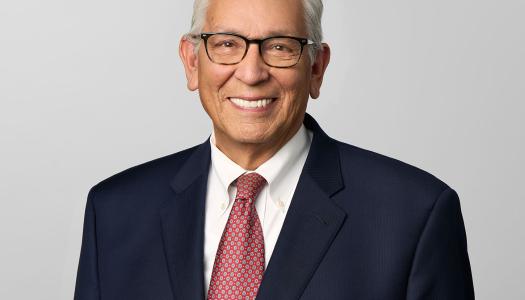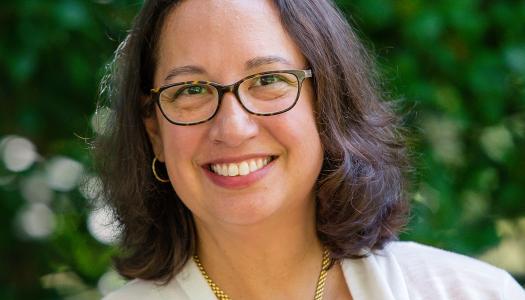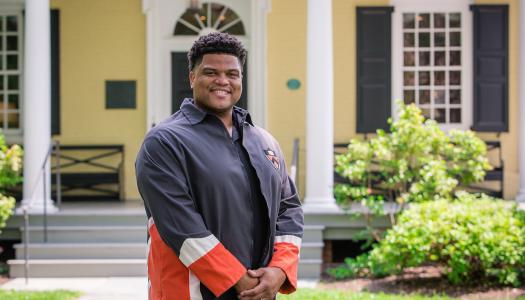Dora Chomiak ’91 wants to bring the world ‘together’ for Ukraine
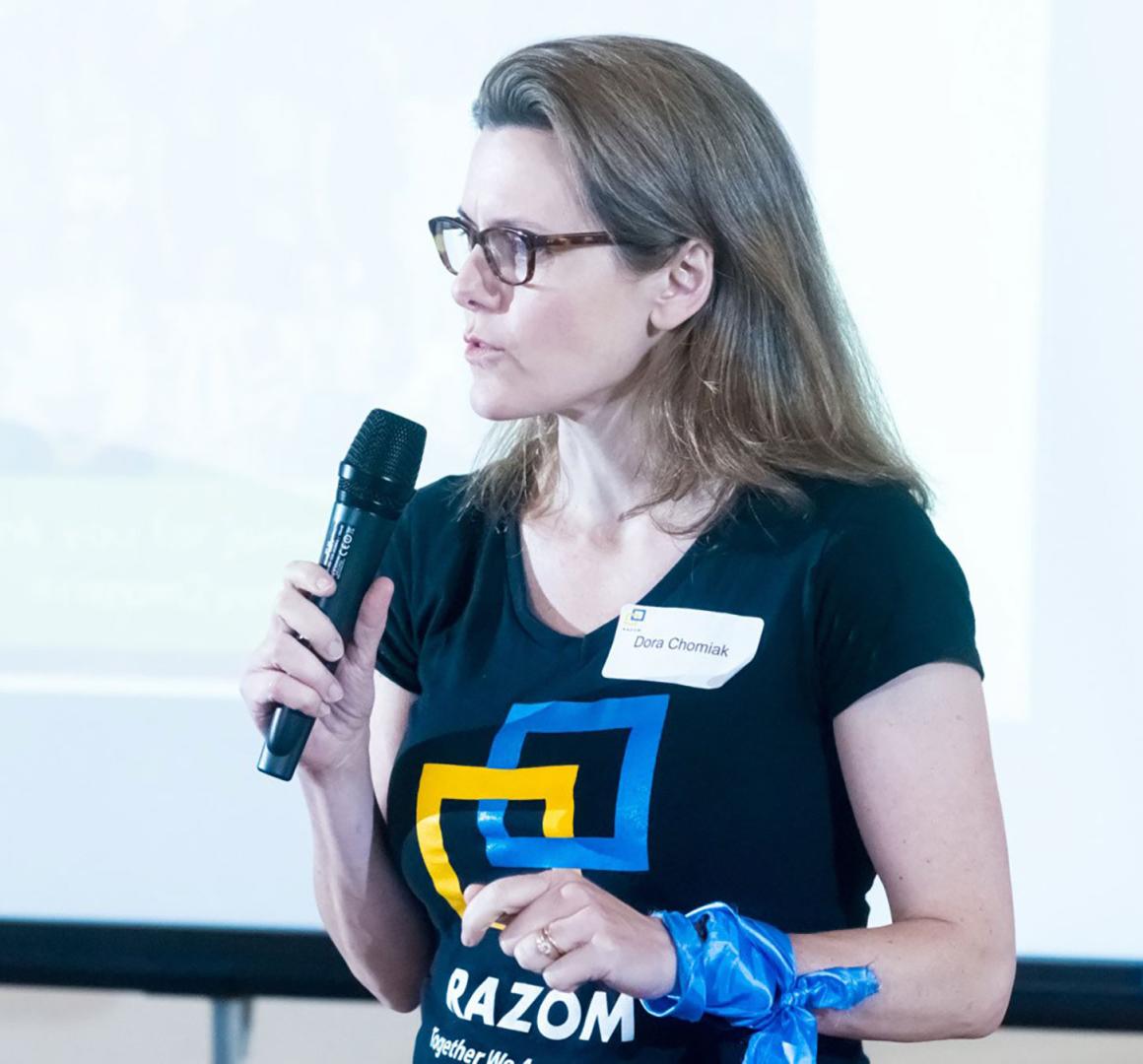
Photo by Vadym Guliuk
The other day, weeks after Russian tanks rolled over the border to begin another invasion of Ukraine, Dora Chomiak ’91 pulled a book off her shelf and began leafing through its chapters. It was a memoir written by her grandfather, who was born in 1890 and joined the Ukrainian army to fight for independence against Russia during World War I.
“I opened to a random page, and what he was writing about then is the same stuff that’s showing up on my Facebook and Instagram feeds today,” Chomiak said. “What has changed is how many people are now paying attention. Ukraine is visible on the world stage, and people are realizing that Ukraine is defending democracy for everyone else.”
Chomiak is president of Razom, an international non-profit that supports efforts to build a more prosperous, democratic Ukraine. Razom, which means “together” in Ukrainian, has been working to raise awareness, sending medical aid and supplies, and helping with the evacuation of Ukrainian children with disabilities during the Russian invasion that has killed thousands and forced more than four million to flee to neighboring countries.
Ever since Chomiak studied in Ukraine while she was an undergraduate at Princeton, she has built personal and professional relationships in Ukraine that have helped Razom act swiftly in response to the Russian invasion. “The reason we can do all this is because we’re an accelerator,” said Chomiak, who is also a managing director of Digital Prism Advisors, a consulting firm that counsels clients on modern strategies for digital growth. “We can bring people together, start something, put it out into the world, and then it spins off and does its own thing.”
On a Zoom call from Razom’s offices in New York, Chomiak discussed the fast-changing events of the past month and explained how she views the stakes now at play: “Ukraine is the line where we will determine: Are we a rules-based system as a global community?” she said. “Or are we an autocratic world now?”
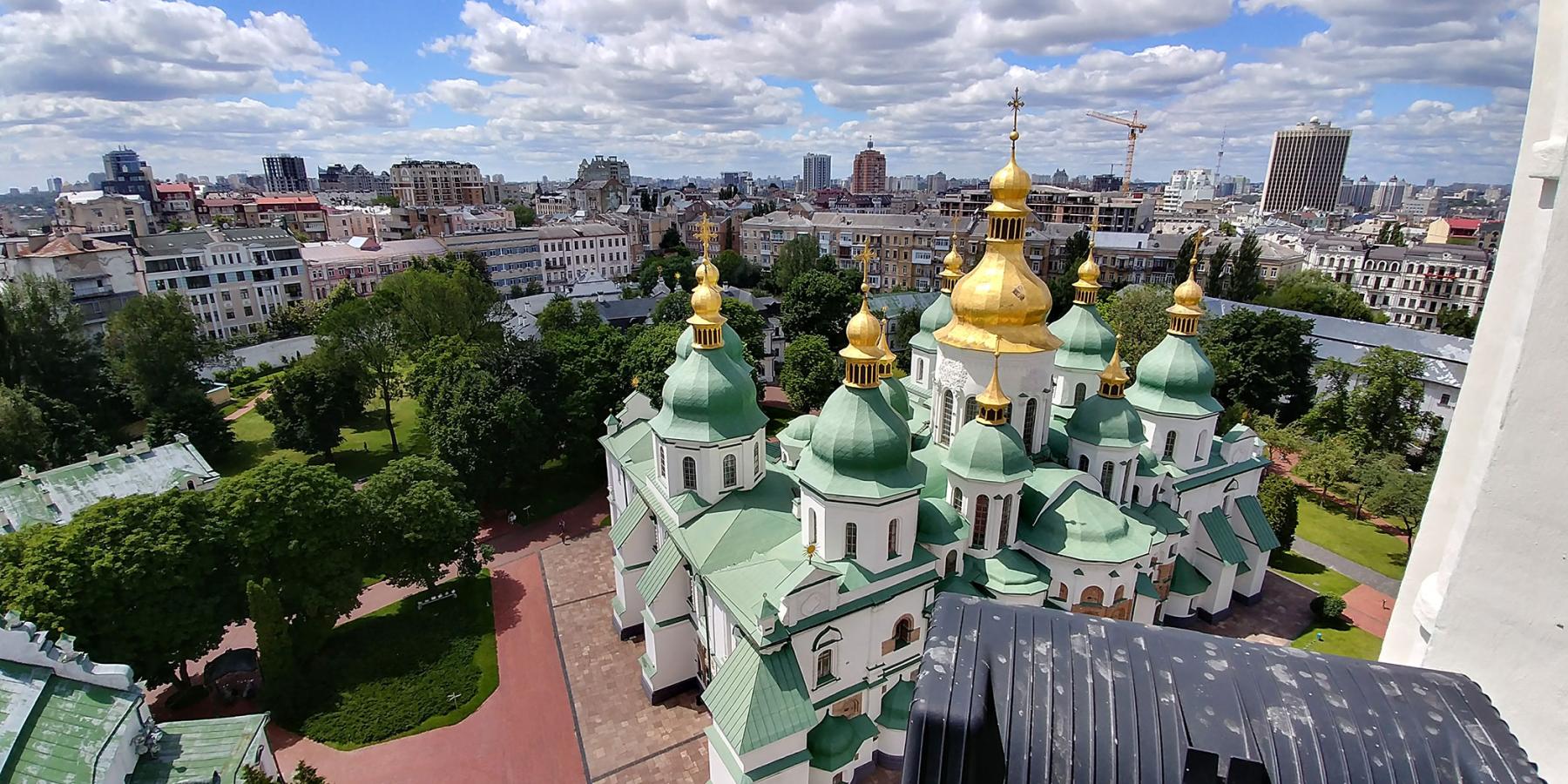
How did you become involved with Razom?
The organization came out of the Revolution of Dignity in 2014, and I came aboard a few months after the founders. Ukrainians then were protesting the Russian-puppet president who was pivoting to do an economic deal with Moscow instead of with Europe. People came out into the streets, and eventually, he fled. And through that, people here in the U.S. were supporting people there. And that is how Razom was created. We are not an aid organization. We work side by side with people in Ukraine to build a more prosperous country. The cofounders were predominantly people born and raised in Ukraine, professional people in their late 20s, early 30s, from different backgrounds, like tech and medicine and marketing. After college, I had worked there for several years in the media, launching a news agency and a network of TV stations, so I had first-hand knowledge of contemporary Ukraine, and it was very easy for me to work with these people who were born and raised in Ukraine.
How much of Razom’s work is fundraising, lobbying, and humanitarian aid and how much is awareness and education? And has that changed in the past year because of recent developments?
It has changed a lot in the past seven weeks. A week before the tanks rolled in, we had gotten together as a board and decided to start an emergency fund in case things went bad. And I was really hoping we weren’t going to have to use that emergency fund, but now we are. We spent most of our eight years doing projects in education and culture and in civic engagement. On Feb. 24, we really turned up the volume on the emergency response program, and we have since built up procurement and distribution networks for tactical medicine, for hospital supplies, and for communications equipment to deliver those hospital supplies. We have delivered well over $11 million worth of materials into the hands of people in Ukraine. We are also evacuating kids with special needs into safety. In parallel with all that, we are shoring up our organization and we are going to be bringing some people on staff because clearly this is at a scale and at a duration that warrants that. We can do all this because we are a flexible platform that is open to bringing different people in. We can be very nimble and get stuff into the field super fast.
You had mentioned that you have offices and staff in Ukraine. What are you hearing from them that isn’t necessarily coming across on the news?
Confidence. The people of Ukraine have got this. One of my colleagues who is from Ukraine put it really well: She now has no fear because the worst thing has happened. And you get that when you talk with people in Ukraine: this is existential for them. They want to stay alive. They want to stay alive in their own country. Some people are relocating to safety, some people are leaving the country, but everyone is doing something to defend the existence of the country.
When was the last time you visited Ukraine?
The last time I was there was in September of 2019. I went there with my fellow Princetonian, Craig Mazin, Class of ’92, who created “Chernobyl” for HBO. He was speaking at a conference and invited me to come because when he was doing that project, we talked a bit about Ukraine and I put him in touch with some people. But since that visit, I ran an English-speaking club for an online course we did for Ukrainian veterans to help them reacclimate to civilian life. The war has been going on since 2014, so Ukraine had half a million veterans already. We had groups of five or six people, and we would meet once a week and just speak English over Zoom. And I had this great mix of guys from ages 20 to 55 — really, really good guys — and a couple weeks ago, one of my guys was killed. And that was hard because knowing him and talking to him online while he sat with his dog — suddenly it is not a statistic.
Your parents came to the United States after World War II, but you never were able to visit Ukraine until you were a student at Princeton, is that correct?
Yes, the short version of the story is they were kicked out by the Nazis and then shut out by the Soviets. They both remembered growing up amid bombings, and their childhoods were spent moving through Europe in different displaced persons camps before coming to North America. They met as adults and got married, and my sister and I were born in New York City and then we moved to northern Virginia. My grandparents lived with us, so it was a three-generation household. We talked history at the dinner table every day — World War I, World War II — you know, each time the Russians invaded, generation after generation. Ukrainian was the first language I learned, and I grew up going to Ukrainian school every Saturday and participating in Ukrainian scouts.
You had to have a visa to visit Ukraine when it was still part of the Soviet Union and they were hard to get. It was the summer between my sophomore and junior year at Princeton when I finally got one to join an exchange program for six weeks in the Soviet Union. This was in 1989, and things were changing. It was palpable. The Berlin Wall was coming down, perestroika and glasnost were happening, so there were more freedoms. People were starting to carry the blue and yellow flag. I was 19 and full of political theory texts and literature, so I loved it.
You ended up writing your thesis about Ukraine, correct?
I came back from the Soviet Union in 1989, completely fired up. I did all my independent work about Ukraine. I wrote my entire senior thesis — with firsthand sources — all about Ukraine. And I get my certificate and it says Russian Studies. This was in 1991, but this whole Russian empire view of the world still holds today as well, which is staggering to me. I am glad that the University has changed their language, and it is not called the Russian Studies department anymore, but I still challenge people to question the framework in which they are looking at this part of the world. Putin tells you that Ukraine is not a real country and what they are doing now is attempting to recolonize. I am hoping people are seeing now that people in Ukraine have chosen, time and time again, representative democracy. They are literally putting their bodies on the line for that right now, and we as a global community owe it to them to say, “Wow, we see you. And here is a bunch of supplies so you can prevent shells from hitting civilians. And then once the shells hit, supplies to literally stop the bleeding.”
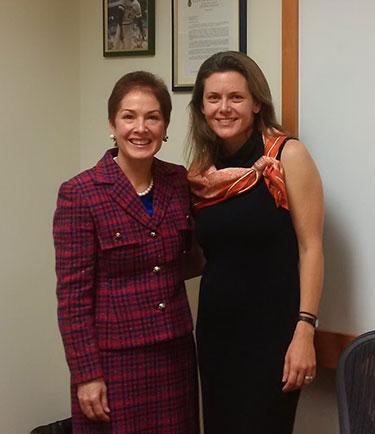
President Zelensky has been the face of Ukraine’s defense, and his background is so unique—
It’s not unique. It is just Ukrainian. That is Ukraine. Ukraine is a bunch of young people who are media savvy, who care about their country, who are not sitting on their hands. He spent most of his adult life speaking Russian; he is speaking Ukrainian now. He speaks English. He is Jewish. He is Ukrainian, and that is the Ukraine that I want people to see. It’s diverse, it’s big, it’s educated, it has natural resources. And it functions — sort of with the messy chaos of democracy, with all these religions and different languages. But that has always been Ukraine.
Ukraine has done an expert job of getting their narrative out to the world during the invasion, on social media and other channels. Since the Russians are feared for their cyber capabilities, were you surprised that Ukraine has been so successful in this regard?
Being good in social is a matter of survival for Ukraine. They have been dealing with Russian disinformation for generations and very aggressively since 2014. But Ukraine is full of creative, entrepreneurial people who take risks. For the past 10 years, Ukraine has been a huge hub of back-office outsourcing for global companies, so you have tons of software engineering happening there. They have the innovation, and they have the connections. The thing that caught my attention when I first went there in 1989 still holds true: the caliber and the talent and the creativity of the people there is amazing.
Recently, the U.S. announced that it planned to accept 100,000 Ukrainian refugees who had been displaced by the invasion. Is Razom involved in getting those people either here or to other safe places?
We are. We have groups of volunteers that are helping people land. Since Ukrainians have been kicked out of Ukraine so many times, the upside is there are a lot of Ukrainian American organizations. There is an infrastructure that can be plugged into. There are schools, credit unions, museums and cultural centers, so I would like us to be able to help make those connections so that when people who are displaced land, they have a softer landing. And what we all want is for it to be a temporary landing, so they can actually be in Ukraine and grow Ukraine. Because that is their home. That is where they want to be.
I have to ask how you are holding up during this terribly sad and infuriating moment for Ukraine.
My coping mechanism is I have severely limited my media consumption. I rely on my husband to tell me the things I absolutely have to hear. (Luckily, he is Class of ’91 with a good liberal arts training.) And we just keep working. I don’t know if it is the healthiest coping mechanism, but all of us at Razom are creating something, taking these immensely generous donations and turning them into something useful in the hands of people in Ukraine. Because Ukraine is going to win. The question is: How long is it going to take? Because every day, it is more human beings [being killed.] That is why it is so important that Europe and America recognize the importance of delivering supplies to Ukrainians. Because they have the skills. They have the willpower. They have been training for this for generations.
